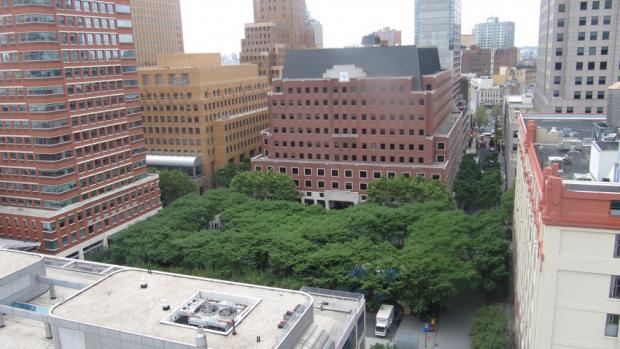NYU to Open Media and Games Network in Brooklyn

New York University is launching the Media and Games Network (MAGNET), a facility in Brooklyn’s MetroTech Center that will bring together NYU and Polytechnic Institute of NYU faculty whose teaching and research bridge technology and culture.
The facility, adjacent to the campuses for NYU-Poly and NYU’s Center for Urban Science and Progress (CUSP), is expected to open in the fall of 2013.
The new multi-school cluster will co-locate teaching and research programs in games as a creative art form, game design, digital media design, computer science, and engineering – with each program retaining its department affiliation and school identity. It will include undergraduate, graduate, and post-graduate students from NYU and NYU-Poly. It will serve as the first space at NYU to co-locate faculty from different schools – including NYU-Poly, which will become the school of engineering at NYU in 2014 – creating a shared facility for collaborative teaching and research.
MAGNET will be led by the following faculty: R. Luke DuBois, an assistant professor of Integrated Digital Media at NYU-Poly and director of its Brooklyn Experimental Media Center; Christopher Hoadley, an associate professor at NYU’s Steinhardt School of Culture, Education, and Human Development; Katherine Isbister, associate professor jointly appointed between Computer Science & Engineering at NYU-Poly and the NYU Tisch School of the Arts Game Center, and research director of NYU-Poly’s Center of Innovation for Technology and Entertainment Game Innovation Lab; Frank Lantz, an associate arts professor at NYU’s Tisch School of the Arts and director of the NYU Game Center; and Ken Perlin, a professor of computer science in the Media Research Lab at NYU’s Courant Institute of Mathematical Sciences and director of the Games for Learning Institute.
“What new forms of culture are being made possible by digital media? How are games and other interactive systems transforming our lives, our ideas, and the world we live in? MAGNET is a new approach to answering these questions by bringing together faculty and students from different disciplines in the same physical space,” explained Lantz. “It’s an opportunity to cut across institutional boundaries and discover powerful new combinations of concepts, techniques, disciplines, and talent in order to learn from the past, engage with the present, and invent the future.”
“We believe this facility will enable exactly the sort of learning that research shows is best: hands-on, with access to peer and expert feedback, as students apprentice to the wealth of research and design that our faculty bring,” said Hoadley, director of the dolcelab, the Laboratory for Design of Learning Collaboration and Experience, and co-director of Steinhardt’s educational technology graduate programs. “This space will be truly ready for technology as a core part of the learning. Students and faculty will have access to everything from whiteboards to projection throughout the facility to share ideas and spark creativity.”
“MAGNET will not only be a great enabler of collaboration within NYU—it will be a powerful attractor for students deciding where to go for undergraduate or graduate study,” added Isbister. “I've already had students tell me this combination of faculty and programs coming together in this new cluster was a deciding factor.
“Brooklyn has a vibrant arts and independent gaming community that already participates in many events at the NYU-Poly Game Innovation Lab. Having MAGNET in place will bring a much larger and diverse group of students and faculty into the mix, creating even more cross-traffic between Brooklyn indies, artists, and start-ups and the NYU/NYU-Poly community.”
“This is truly a rare opportunity to break down the walls that too often divide technology and the arts,” noted Perlin.
“The opportunity to collaborate in a single facility with colleagues from so many other NYU programs that have invested in media research, gaming, and education is tremendous,” said DuBois, who also has appointments in the Interactive Telecommunications Program at Tisch and in the Department of Music and Performing Arts Professions at Steinhardt. “Our research is explicitly interdisciplinary and outward-facing, and we look forward to having such a great, state-of-the-art facility right in Downtown Brooklyn.”
The facility is designed to allow faculty and students working in complementary fields to share resources and forge connections. The new space—designed collaboratively by the partner schools—will enable inter-school and inter-disciplinary collaboration, and will provide flexibility to accommodate current needs, future technology, and the development of new curriculum. Among the site’s features are: power and data infrastructure to support gallery-like shows, research studies, and student projects; classrooms equipped with instructional technology; and specialized spaces for audio engineering, motion capture, and digital arts.
“NYU has emerged as one of the top universities in the country in game design and game studies, a tribute to its faculty strengths in the multiple disciplines making up the field,” said NYU Provost David McLaughlin. “The creation of MAGNET, which grew organically out of the interlocking and vibrant research collaborations that had already brought together faculty in these programs, will only enhance NYU’s profile in this cutting-edge sector of technology.”
Beginning in the fall semester of 2013, the space will house graduate programs in Game Design (MFA, Tisch); Games for Learning (MS), Digital Media Design for Learning (MA), and Educational Communications and Technology (Ph.D.) from Steinhardt; and Integrated Digital Media (MS, NYU-Poly). MAGNET will also house undergraduate majors in Integrated Digital Media (BS, NYU-Poly) and minors in Game Engineering (Computer Science and Engineering, NYU-Poly).
MAGNET will be located in newly renovated space of nearly 40,000 square feet on the 8th floor of 2 MetroTech Center. It has been designed by Gensler Architects, in collaboration with the facility’s partner schools, to provide offices, studio and work spaces, teaching labs, and research areas.




